Viacheslav Chornovil, ‘General of the Zeks’: Fragments from the book “Ukrainian Silhouettes”
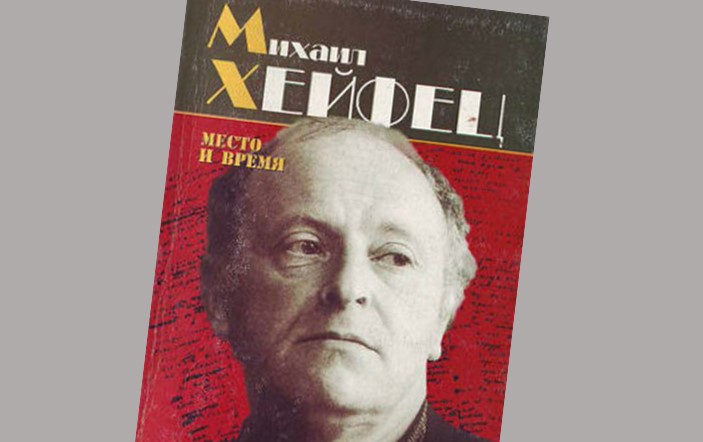
The Leningrad writer [Mikhail Kheifets] ends up behind KGB bars then in a camp in Mordovia, where the entire crème de la crème of the Ukrainian, Lithuanian, Armenian, Zionist, and other anti-communist resistance movements are incarcerated. The Jewish writer’s acquaintance with Ukrainians in the camp develops into an interest, then a great friendship.
When I was on the outside, I didn’t know about [Viacheslav] Chornovil. I had heard about Ivan Dziuba, [Ivan] Svitlychny, and [Valentyn] Moroz from Ukrainian dissidents, but Chornovil’s fame had not reached my ears. I saw his name for the first time, not in a page of a newspaper, a typewritten page of the Chronicle of Current Events, or some other samizdat document, but on the rear side of a box of thread under my sewing machine table.
Spring 1975. In the workshop of camp № 17а [a camp in Mordovia] stand the sewing machines of the Podolsk Factory; each of the workshop’s female veterans has 20–25 years of camp service.
After working for two weeks, I began investigating my workplace; from the cluster of boxes of thread I pulled out a box, and on the rear side I found a column of signatures of the former occupants of my “work station” (as the guards called it). I remember that the first signature in the column was that of the Moscow writer Yulii Daniel; followed by the signature of Valerii Ronkin (senior scholarly associate from Leningrad, a defendant in the trial of the Leningrad Social-Democrats); then the signature of Yuri Galanskov, poet and hero of a famous political trial; then the signature “Ilya Glazer,” a biologist, Doctor of Sciences, a Zionist; followed by two signatures: Dmytro Kvetsko and Viacheslav Chornovil.
I managed to become acquainted in the zone with Kvetsko, a teacher of Ukrainian literature and founder of the illegal Ukrainian National Front in Ivano-Frankivsk oblast; he was working in the neighboring row, across from me. Meaning, that the last signatures were recent ones. But who was this Chornovil? At roll calls, a prisoner with such a surname had not been called…

I first met Chornovil on a transport from the Saransk KGB detention center back to our zone in February 1977.
This phase in my camp biography was eventful. In Saransk, I managed to outplay the KGB officers and convince the investigators that the manuscript of my camp notes Place and Time was supposedly destroyed in the furnace of the boiler room (it was at this very time that it had sailed over the “fence”). Thanks to my “confession” and “candid testimony during the inquiry,” I was able to wrest permission from the KGB for a visit from my wife and for a gorgeous and extraordinary parcel that I was bringing to the zone to treat my friends.
During the transfer to the Potma branch leading to a strip of dozens of Mordovian camps, I said goodbye to my friend, Azat Arshakian; he was being released.
On the Potma–Barashevo stretch I managed for the first time, through the inner bulkhead of the prison car, to make the acquaintance of Alik Murzhenko, the hero of the Jewish airplane hijacking case in 1970, and from him I heard about the “mowing of 1977” in Moscow and in Ukraine (the arrests of the leaders of the Helsinki Groups: [Yuri] Orlov, [Aleksandr] Ginzburg, [Mykola] Rudenko, and [Oleksiy] Tykhy).
During the next stage of the journey, from Barashevo to the camp capital of Yavas, I managed to see and shake hands goodbye with Yura Fedorov, another one of the “1970 pilots” (both of them, [Alexei] Murzhenko and [Yuri] Fedorov, as well as Ed[uard] Kuznetsov, were imprisoned in a “special,” that is, a special forced labor camp, not a strict regime camp, like the one I was in.
Finally, in Yavas we, a group of transported prisoners headed for the 19th zone, were unloaded from the “Stolypin car,” and here we began waiting for the “Black Maria,” a van equipped to transport prisoners, for the final push into the zone.

We stood on the platform for quite a long time.
The “Black Maria” was nearby, but the loading was delayed; the “fuzz” were waiting for someone. Then the brakes of the following structure rumbled. We look and see two prisoners being led, a tall one and a short one. We knew the short one well; it was Artem Yuskevych, the mechanic from our workshop, a cocky Ukrainian from Tallin (he was sentenced to five years as a member of the “Democratic Movement of Estonia”).
The blustering Artem was shuffling along in his boots next to the slim prisoner with the blond moustache, who resembled the young Nekrasov. He was dressed in a ragged uniform washed out to an ashen color. Artem was explaining something to him, waving his fingers that were stained dark brown from tobacco; he was probably talking about us, the transportees to the 19th [zone]… I thought so because, when both of them were brought to our group, the prisoner did not start by introducing himself and finding out who we were, but quickly, like an anti-aircraft machine gun, he began blurting out the latest dissident and camp information.
“Orlov and Ginzburg have been arrested.”
“We heard already.”
It is unbelievable how much he managed to report in the minutes between his arrival and the loading of our companies into the “Black Marias.”
“Who are you?” I interrupt the volley of information with a natural question.
“Ah, yes, I am Chornovil.”
Then I shook his hand.
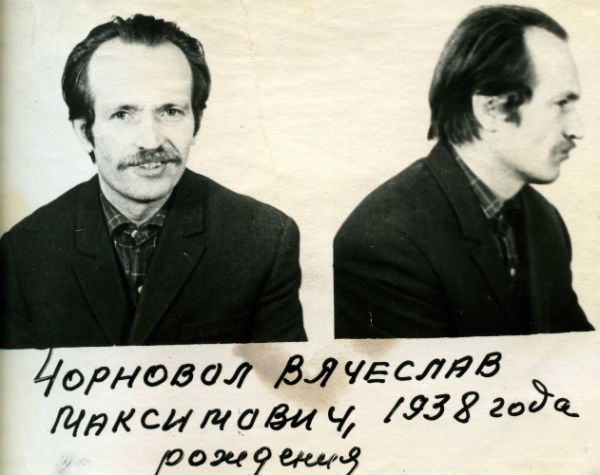
It turned out that Chornovil had recently acquired the status of a political prisoner, and Major Aleksandrov had given him six months in a PKT [cell-type facility]. The camp prison (as well as the SHIZO [penalty isolator] was located on the territory of the 19th zone; that’s where they were transporting him now.
This status meant the following: the complete rejection of the performance of slave labor, of lining up for “inspection,” of entering the dining room, attendance at political studies, and the wearing of stripes; in a word—the entire “regime” developed by the MVD for camps and prisons. This is what Chornovil had done. He totally rebelled against the “regime”!
Life in the PKT is not fun. Instead of to a barrack, the prisoner is transferred to a cell, sometimes solitary confinement; instead of a toilet on the street, a latrine bucket stands in the cell; rations are reduced by half; the prisoners’ commissary, that is, the purchase of additional foods in the zone shop is reduced by three times and correspondence by four times (one letter every two months instead of the usual two letters a month).
Even the usual Mordovian prisoners are bored when they are transported to a PKT! But Chornovil was heading for the PKT like Natasha Rostova going home after meeting Prince Andrei at the ball. He radiated energy, he was much livelier and more cheerful than we, who were moving from sated sitting in Saransk to the customary zone in the open air.
He was put in a paddy wagon, as was done properly for especially dangerous [prisoners], into a “glass,” and from there he continued to pour the “last news” onto our company through a metallic wall:
“In the 19th [zone] you will meet Osipov, say hello to him from me.”
“Why the 19th? He’s with you, he had a troika … (Eight months earlier Vladimir Osipov, leader of the Russian nationalists and supporter of a Single and Indivisible Russia, was transported to the 19th zone for a troika [three-member judicial board], where Chornovil was imprisoned).
“He was at a troika!” murmured a satisfied voice from the boksik [a tiny, solitary “closet” in which new prisoners were confined prior to their assignment to cells—Trans.]. “The KGB was hoping that Chornovil and Osipov would quarrel, and the KGB would be pleased. Well, we decided to lay aside our differences until the victory over Bolshevism. We held every action together! Yes, Mikhail. Osipov and I were on a hunger strike in August when you and Paruyr Hayrikyan were stripped of vising rights …
(At that time we had been denied visits for exposing Kuziukin, although, God knows, I believed Vladimir Ivanovich almost until the very end. But the KGB, as always, saw a guiding Jewish hand behind young Hayrikyan’s back. Later in the zone they created a reputation for me as a “storm of spies,” which was entirely undeserved.)
“They tolerated us together for a long time, but when Volodia was on a hunger strike on 12 January, Ukrainian Political Prisoner Day, [Yuri] Andropov’s patience ran out, and Osipov was transferred back to the 19th [zone].”
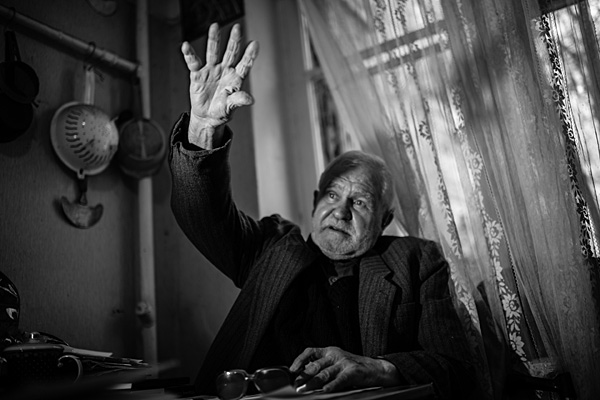
“Osipov went without food in support of Ukrainian demands?” marvels Sergei Soldatov, a seatmate in the paddywagon.
“Uh, no!” Viacheslav laughs in the “glass.” “Not so far! But he demanded the release of Ukrainian political prisoners, protested against the persecution of people who reject violent actions…
“Guys, right now I’m planning to hold a series of hunger strikes in the PKT in support of political prisoner status. I will be holding a hunger strike in defense of each of the points of the Statute and offering a detailed statement on why this paragraph of the Statute is necessary.”
“I will hold hunger strikes only if they place me from the PKT into the SHIZO every day of the hunger strike. At any rate, you can’t assuage hunger with this 400-gram ration, so at least the day will pass. What do you think?”
Then the addresses of exiles and activists of the dissident movement—everyone with whom you could corresponded—rained down on us from the “closet.” This stuck in my head because at this very time I obtained Stefania Shabatura’s address from Viacheslav. He had memorized not only the address but even the postal code linked to it: “With a postal code, it has more chance of getting there.”
Former Captain-Lieutenant Lysenko was listening to Chornovil, his eyes gleaming with love. Traveling like that to the PKT, to the “prison in a quadrant,” career seaman Lysenko knew how to value what was natural, like fire, courage.
We reached the watch, we were separated from Chornovil (he was taken through the industrial zone to the PKT, we were let into the headquarters for a search), and right after the search Vitalii came up to me and said:
“What a guy, eh? A Ukrainian! And you said that we don’t have enough political minds…”
“Bobby [Boris] Penson, he knows Slavko,” I say. “Together they put out the Chronicle of the Troika [zone № 3 in Mordovia]. He put it this way: Chornovil is a head taller than all the Ukrainians here.”
“One of these is enough for us…”
About a week after arriving at the zone, a new friend, Vladimir Osipov, warned me that a serious action was being planned in the strict-regime zones in Mordovia: a hundred-day strike demanding the implementation of the Status of Political Prisoner of the USSR.
“Why didn’t Chornovil wait for everyone? He already has this status.”
“And he did wrong,” Osipov replied gravely. “He slipped into the PKT ahead of time. But now he needs to be supported. Do you agree to take part?”
“So, Chornovil is standing at the wellspring… But due to his fervor, he is out of order, and he is being replaced by Osipov and Soldatov.”
“For what date is the start of the action scheduled?”
Osipov is stubbornly silent.
“This is not idle curiosity,” I explain. “I have my own task and my own work. I am writing a book about the zone. I have to decide whether I will have time to tidy my affairs by the start of the action; then I will give you my answer.”
Osipov thinks, solving the problem for himself. The start date of an action is always the prisoners’ secret, which the administration wants to penetrate. I don’t know the meaning of such secrecy. It seemed to me that it is some kind of mutual game that brings diversity into the monotonous life of the prisoners and the administration. Finally, having decided, Vladimir Nikolaevich says:
“I think in a month and a half.” But he didn’t give an exact date…
“Then I have time. I agree. On two conditions.”
“Yes?”
“First, besides you and Sergei Soldatov, no one, not even the most loyal people, should know that I am taking part in this matter. With my current occupations, any interest in my person on the part of the KGB, above and beyond the usual, is harmful to me.” He nodded his approval.
“The second condition: In exchange for my participation in your action, I will get an interview from you, Vladimir Nikolaevich, about your life for my book.”
“It’s settled.”
That’s how the Status action began for me.
The KGB sensed something and tried to probe our plans. The domestic politician Fedir Senchuk, camp barber to the homosexuals, recounted in a “friendly” manner:
“Yesterday Chornovil was brought to me for a haircut. The guy is really offended. He says, ‘I have Status, but my comrades are not supporting me.’”
However, Fedia was hardly acting on behalf of the KGB; for subtle actions, the vice of snitching is too obviously written on his face. Most likely he was working for an MVD operative.
For the first time, on 21 April 1977, we did not go to the construction site or to work, we tore off the stripes, and announced a complete sabotage of all camp requirements for a hundred days in honor of the upcoming Belgrade Meeting of 35 states of Europe and America.
The most difficult week of my camp life came after the transition to political prisoner status. Every day, one by one, Ushakov, Shakirov, Soldatov, Ravynsh, and even the boy Misha Karpenko were taken away to the punishment cell, but they didn’t touch me.
I remember walking back and forth outside the barracks, the ground muddy from the rains, pushing my heavy tarpaulin boots into it: “Aren’t they going to take me? Anything can be expected of them… And what will my comrades think!”
But on 28 April I was summoned to headquarters—thank God!—and they read out a resolution for eleven days in the punishment cell. It turned out that the delay was due to the need to stick me with an additional punishment—take me off “preferential upkeep,” granted by Zinenko during [Vasyl] Stus’s hunger strike. Farewell, my share in the fund of the repressed prisoner!
Finally, I was brought to the punishment cell. There, the very air is electrified by nervous shock. Every spot in all the cells is occupied by prisoners, and in the corridor, the “master of the zone” Pikulin [read: Nikulin—Trans.] is rushing about like a chimpanzee in a cage.
Sergei Soldatov hugs me on the threshold and gives me the punishment cell news:
“Every day the authorities appear with all their persuasions. Slavka talks with them. I tell you, he has quite the mouth on him!” and he smirks with satisfaction.
At that very moment Nikulin dashes over to our cell:
“Kheifets, why did you acquire the Status? You have absolutely no independence of actions, self-esteem. You do everything your zek general Chornovil tells you!”
That’s how I heard the words that I put into the title of this section. Soon, however, the major stopped appearing at the punishment cell. One time he ordered the removal of German Ushakov’s underwear—he was being dragged off for his latest stint in a punishment cell—so that he would be colder at night just in his uniform. Then, as a sign of protest, Soldatov stripped to the waist and announced a “cold strike.”
From my hand to his, I submitted a statement to Nikulin (he took them contrary to the regime: He still hoped that this was a statement about rejecting the Status or a request for mercy), and asked the major to strip me completely naked tomorrow, Bolshevik Press Day, my professional holiday, so to speak, thereby marking the anniversary of the communist press.
Nikulin screamed: “I will give your statement to the prosecutor to initiate criminal proceedings!” And he flew out of the barracks like a champagne cork and thereafter appeared only in case of emergency. Now they sent the deputy commander of political affairs to go “agitating”…
During the first Status days, our punishment cell was merry. As a rule, the most difficult thing in a punishment cell is not hunger, not the cold, but solitude and silence. Conversations between cells are forbidden, and if you call out to your neighbors, after the end of your solitary confinement, you risk losing your “prisoners’ commissary” or even getting another stint in the punishment cell.
You don’t want to risk this … But then we deliberately planned for ourselves a hundred days without the prisoners’ commissary and a hundred days in the punishment cell. And in that situation, how could they bite us? The punishment cell turned into a status club, its inhabitants called out to each other freely, and any comment by the guard was followed by the stereotypical response, “Chief, we have the Status! We are beyond your law!”
They switched off instantly. (A curious detail: They generally tried to make comments only if we spoke in Russian. When we switched to English in order to make our negotiations among the cells incomprehensible to the guards in attendance, they completely stopped listening to anything, as though it was not the voices of prisoners being carried through the punishment cell but, for example, the singing of birds or classical music.)
One of the advantages of Status incarceration compared to the usual punishment cells was the abundance of information. In a normal punishment cell, a prisoner is disconnected for two weeks from any sources of information, even Soviet radio. But during the Status strike, we were able to follow all the newspapers because every day someone from among the Status prisoners was ending his stint and leaving for a shift change.
The first thing that he did was read newspapers in the local reading room, and when he was brought once again to the punishment cell—sometimes within a day, sometimes within two or three hours—he would begin his latest stint with a lecture reviewing newspapers and magazines.
I remember that Misha Karpenko, who was brought back to the punishment cell forty minutes after leaving it, explained it this way to our team: “I managed only to have lunch in the dining room; from there I went to the reading room, and then they summon me.” “Aw, Misha, you should have started with the reading room!”
In addition to the press review, every day we listened to the latest news on the radio.
Chornovil, the occupant of a PKT cell, which is supposed to have a radio loudspeaker, would write down all the news and then dictate them to all the cells (when they started dragging Viacheslav to the cells, too, Vladimir Osipov went to the neighboring PKT cell and carried out the duties of “news master” very precisely).
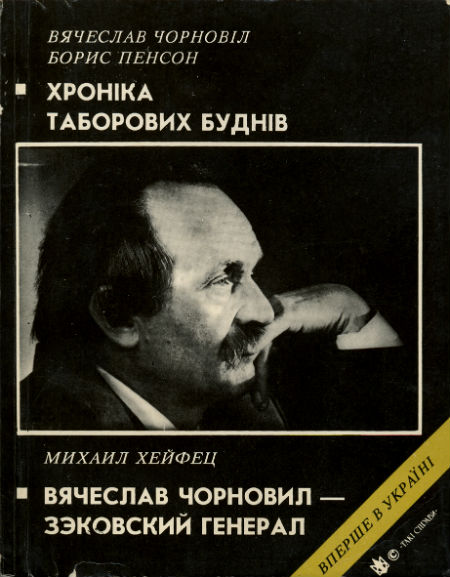
Our deputy commander of political affairs, Senior Lieutenant Kilgishev, tried to stop Chornovil:
“It is forbidden to shout in the punishment cell.”
“Citizen-deputy commander of political affairs, I am conducting political studies. You of all people cannot have Status holders not listening to political lectures for a hundred days ... I am not informing them about anything but the Moscow news …
What could he say? The regime needs quiet in the punishment cell, but the regime also needs daily political studies …
The deputy commander of political affairs began a competition with Chornovil. Every day he began walking in the punishment barrack and holding soul-saving conversations with us. The favorite topic of these talks: “There are no political prisoners in the USSR; that is why there is no political prisoner status.” He was a former teacher, who ended up in the MVD through planned requisitioning by the party. He was a soft-natured man, not evil, and he had a difficult time of it with mouthy prisoners of the Chornovil type, whenever the officer sought to prove that we are not who we are but “criminals.”
The main argument of the deputy commander of political affairs was as follows: Since no special Code for political crimes exists in the state and there is only a single Criminal Code, ergo there are no political prisoners, only criminals.
“Do political prisoners exist in other countries, Western ones, for example?” Chornovil asks out of curiosity.
“Over there? Of course.”
“No special code for political prisoners exists in Western states, either, but the status of political prisoners is observed …”
At this very time, an announcement appeared in Pravda that the conservative government of Great Britain had villainously decided to abolish the status of political prisoners who were operating in the prisons of Ulster because “they were alleged terrorists.” That is how we learned about the existence of this status in the West.
“Either we are political prisoners,” as Slavko was beating this into the head of the deputy commander of political affairs, “and then you must recognize our status, or political prisoners do not exist anywhere in the world, and we will then put an end to shouts of “Freedom for prisoners in Chile!”
“But there should be a legal definition of a political prisoner before speaking about his status,” the deputy commander of political affairs objects. “Otherwise, every thief will declare himself a political; he too is struggling against society in his own way!”
“The definition of a political prisoner has already been formulated!” It is no simple thing to out-argue Chornovil. “You know by whom? The book by an English [read: African-American—Trans.] communist—it’s in the library—contains a definition formulated by Angela Davis… You remember who Angela Davis is?”
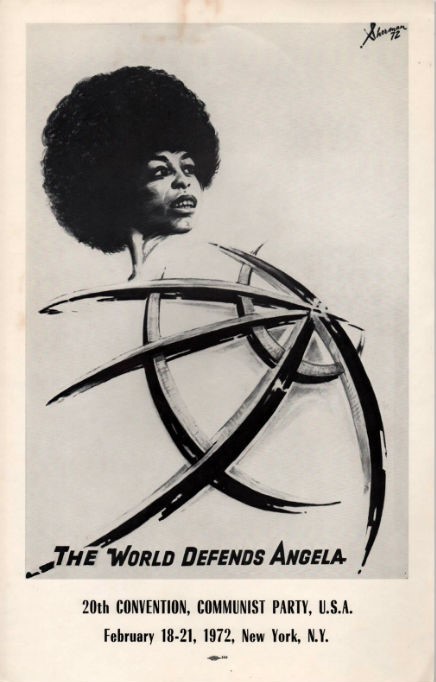
“You yourself understand what I remember!” the deputy commander of political replied angrily.
“Excuse me, I’m talking about something else. Is she an authoritative figure for you?”
“Yes.”
“So, Davis defined a political prisoner as someone who has committed an offense against the laws of a given state, not in the personal interest but public interest or some specific group. And, after all, the court charged each one of us, well, nearly each one, not with mercenary motives but the opposite: It made us appear guilty of investing our own money in our ‘criminal act.’”
The reaction of the deputy commander of political affairs was completely unexpected:
“So, I didn’t convince you,” he said, upset. “I have been talking in vain all this time?”
At this point, listening to their conversation at the door, I realize: For Chornovil, this is a discussion, but for the deputy commander of political affairs, it is an assignment!
“You did not speak in vain at all. I truly wanted to hear your side’s position—what if we are wrong about something; after all, we too can make mistakes. I have thought over and over about the justice of our actions. And, unfortunately, Comrade Kilgishev, you have not convinced me.”
“But in demanding the Status, you want to violate Soviet law. But our task is to serve the law, not help it to be violated.
“You’re right, we want to change the law. And we deliberately set out to violate it…”
And you call yourself a human rights defender! Well done, deputy commander of political affairs! He parries deftly!
“But you have left us no possibility to change the law, which we regard as incorrect. In addition to the violation of this law by the order of appearance. We sent the draft Status to the Supreme Soviet and received no response on its merits. Only then did we decide to break the law...
“Well, I can’t speak for the actions of the Supreme Soviet,” and the deputy commander of political affairs departs.
...That evening Viacheslav was in a wonderful mood, and he began to sing. Then the entire punishment-prison block burst into song. The singing of the prisoners in the punishment barracks reached all the way to the zone! The magnificent singer Paruyr Hayrikyan sang solo.
Chornovil sang songs and read the poems of Aleksandr Galich; he loved them and knew them by heart. He especially loved [his poems] about the Decembrists, and he corrected the author slightly:
...you want to go to the square?
can you go to the square?
I need to go to the square
at the appointed time ...
Mikhail Kheifets,
9 December 2018
Originally appeared in Russian @Istorychna Pravda
Istorychna Pravda’s ‘Shalom!’ media project, which explores the Ukrainian-Jewish dialogue, is made possible by the Canadian non-profit organization Ukrainian Jewish Encounter.
Translated from the Russian by Marta D. Olynyk.
Edited by Peter Bejger.



















